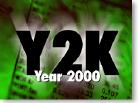|
Y2K, your bank, and you
|
 |
January 11, 1999: 5:05 p.m. ET
Financial institutions offering a wealth of information on preparing for Y2K
|
NEW YORK - Bankers are worried that "doomsday" reports about the Year 2000 computer problem will scare customers into yanking their hard-earned money out of their accounts and stuffing it under their mattresses.
With visions of stampeding customers pounding at their vaults, bankers are unleashing an avalanche of information through the mail and online to convince customers to leave their money where bankers say it's safest -- in the bank.
All federally insured financial institutions are required to have Y2K customer awareness programs. In addition, an FDIC report entitled "The Year 2000, Your Bank and You" and a Year 2000 "statement stuffer" are being made available to banks so they can pass them on to customers.
Many banks also have Y2K information on their Web sites and some are making information available through toll-free hot lines.
Banks are taking Y2K seriously, said GartnerGroup research director Lou Marcoccio. "We expect U.S. banks to fare exceptionally well," he said.
GartnerGroup, based in Stamford, Conn., specializes in information technology and is advising corporations and governments worldwide on Y2K.
Marcoccio recently testified before a U.S. Senate committee that while banks are leading the way, they weren't driven to begin compliance until they were pushed by federal regulation. That also is why banking officials say customers shouldn't worry about small banks not being Y2K compliant. They operate under the same federal guidelines as big banks and must be ready to deal with any problems that may arise.
At Comerica Bank, headquartered in Detroit, Y2K is the top priority. "The board, executive management, and employees … we've been addressing Y2K since 1996" said spokesman Wayne Mielke. "Our front-line staff is prepared to respond to customer questions. We have contingency plans in place for everything from ATMs to staffing at branches to back-office support. We've also adjusted vacation policy so we have maximum staffing through January 2000."
Marcoccio said banks -- along with insurance, investment services, pharmaceuticals and computer manufacturing -- are the least likely industries to have a "mission critical failure" because of a Y2K problem. Still, he expects 15 percent of those types of companies to have a "mission-critical failure," defined as something that can result in shutting down a business or causing a considerable loss of money or customers.
Despite the progress banks are making in addressing the Y2K issue, there's still an unknown factor -- customers. Who's to say whether there will be a run on the banks? Will television news be showing mob scenes outside American banks much like we saw in 1998 in Moscow?
The Federal Reserve is hoping the effort to educate the public will work, but it's not taking any chances. The Fed plans to add $50 billion to the $150 billion it already has on hand to loan to banks.
That way, there should be plenty of money on hand if customers decide to stash some cash in the cookie jar. In fact, every American household could withdraw about $500 for the Y2K weekend without the banks being caught short on cash.
But nervous bank customers will need to watch out for con artists. John Hall, a spokesman for the American Bankers Association, said any time there's a potential problem involving money, scammers will find a way to capitalize on it. So don't be swayed by any ads promising to keep your money "safe" during the Y2K weekend.
Hall said the banking industry has invested more than $8 billion to find Y2K problems, fix them and test them -- over and over again.
"There are backups for everything. All records are backed up, not just on disk but also on paper," Hall said, noting that many banks also are considering sending customers statements at the end of December and at the beginning of January.
Now that you know what the banking industry is doing to thwart Y2K gremlins, what should you be doing? The ABA's Hall has some tips:
- Stay informed. Read stories to stay on top of the issue.
- Read everything the bank sends you about Y2K issues.
- If you have questions, ask your banker or talk to the person assigned to handle Y2K problems at your bank.
- If you don't already keep bank statements, make sure to keep them a couple of months before the date change.
- If you bank online, make sure your computer and your software package are Y2K compliant.
- Make records of your accounts on backup disks.
- When Dec. 31 arrives, withdraw the cash you'd take out for any holiday weekend -- but if you feel you need more your bank will be ready.
- Avoid scam artists who want to "hold your money" during the date change.

-- by Bank Rate Monitor for CNNfn
|
|
|
|
|
 |

|

